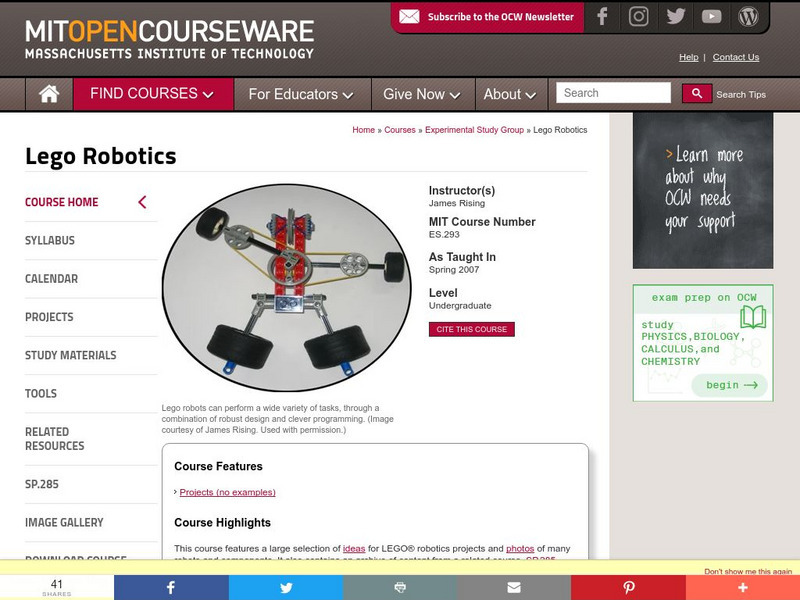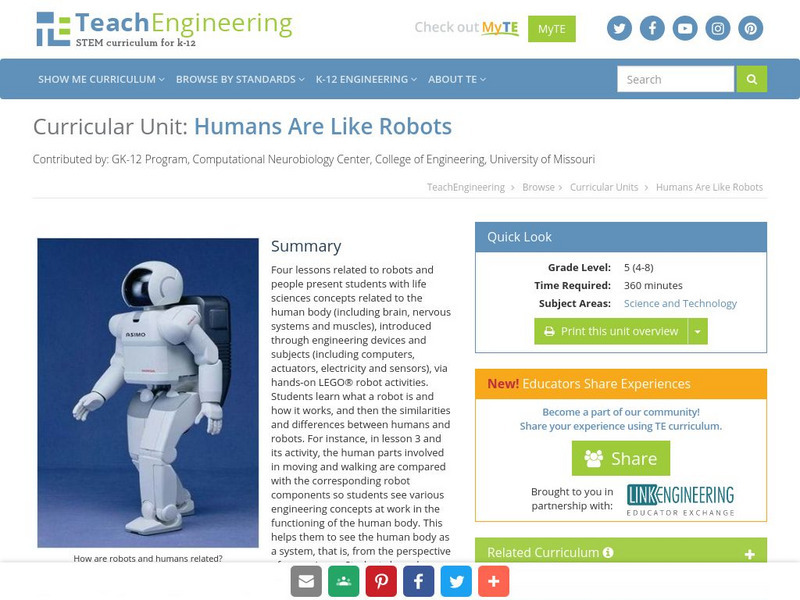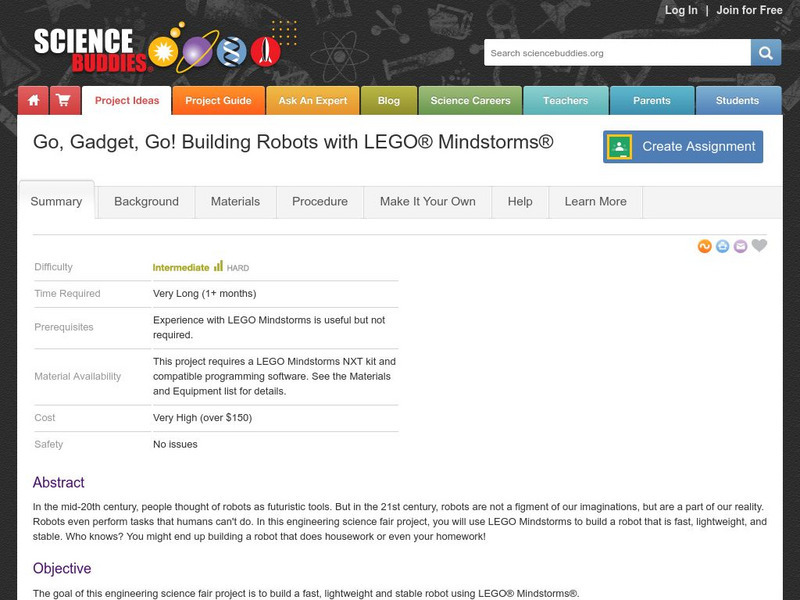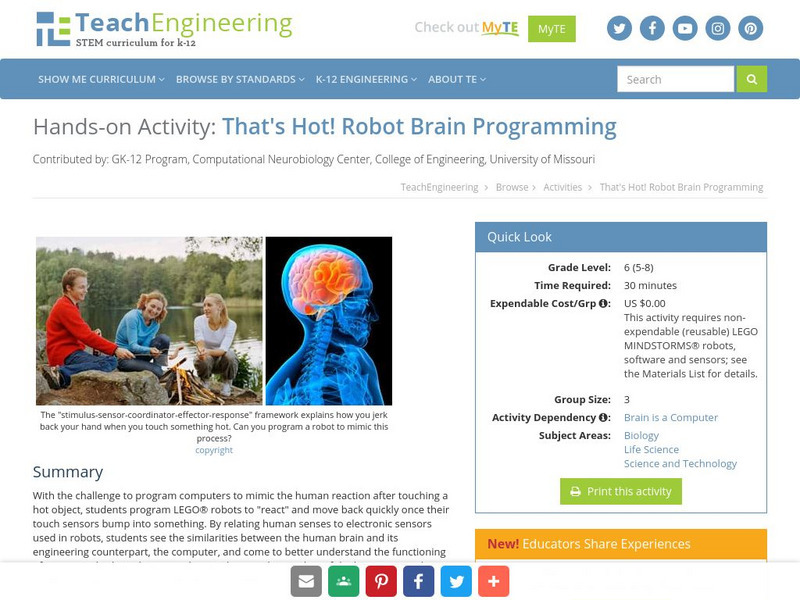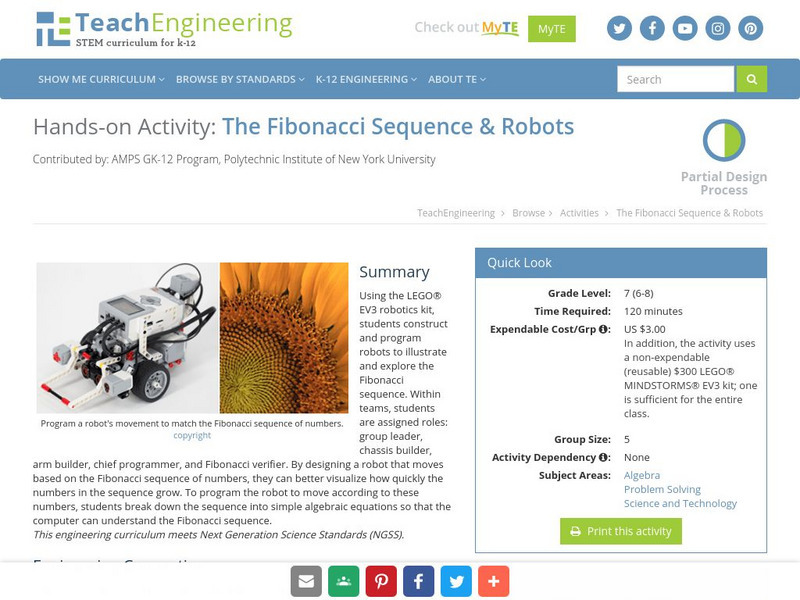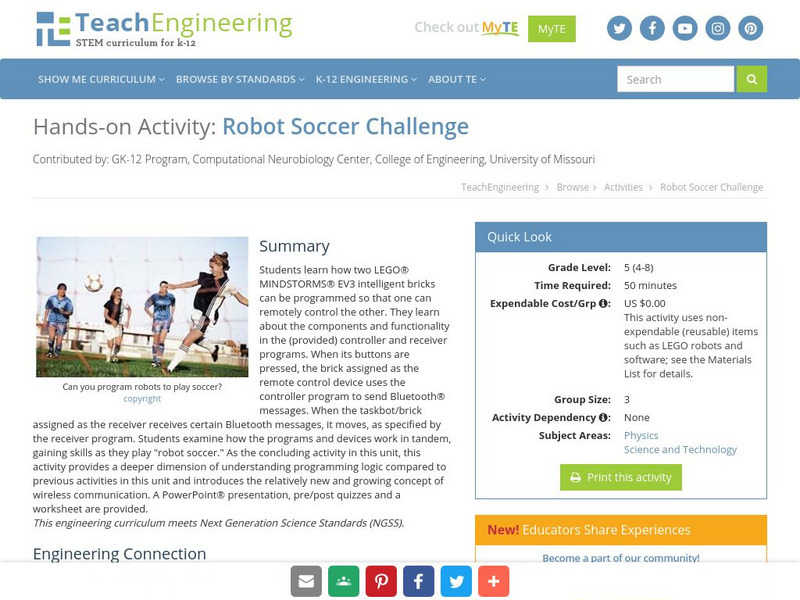Hi, what do you want to do?
NOAA
Come on Down!
What do we do when a dive is too dangerous for humans to accomplish? Send in the robots! Middle school scientists get acquainted with several different models of submersible robots in the second lesson of six from NOAA. Lab groups then...
Curated OER
Introduction to Lego Robotics
Young scholars utilize computer programs to operate a simple robot. In this technology lesson plan, students create robots using Lego pieces and simple motors to move them. Young scholars measure the speed of the robots by...
Curated OER
Lego Robotics: Measuring Speed
Young scholars build and program a LEGO robotic car as well as measure and graph its speed. They acquire familiarity with principles of construction, motion, design and problem solving. They compare a robot's speed over two different...
Teach Engineering
The Fibonacci Sequence and Robots
What better way to introduce the idea of a sequence than with robots! An educational activity explains the classic Fibonacci sequence before pupils build and program a robot to move. Additionally, the activity challenges individuals to...
DiscoverE
My Friend Robot
Can you do better than a robot? Teams write instructions for a hypothetical robot to build a structure. They test their instructions by acting them out to see if they produce the desired structure.
Teach Engineering
Accelerometer: Centripetal Acceleration
Scholars build robotic arms that swing back and forth and use them to collect velocity and acceleration data. To analyze the results, pupils compare data to the equations for angular velocity and centripetal acceleration.
Teach Engineering
About Accuracy and Approximation
How accurate are robots? Groups draw lines by moving robots backwards and forwards by one rotation of the wheels. Using the appropriate formula, they determine the percent error in the length of the lines in relation to the calculated...
Teach Engineering
Automatic Floor Cleaner Computer Program Challenge
Have your class use the engineering design process to program a vacuum robot. Using computer engineering concepts, teams program an automatic floor cleaner to traverse designated patterns.
Curated OER
My Wet Robot
Students design an underwater vehicle. In this engineering lesson, students will design an underwater robot that includes specific systems for it to function properly. Each group will present their prototype to the class.
Teach Engineering
All Fats Are Not Created Equal
Apply robotics to connect physical properties to chemical properties. Future engineers use robots to determine the melting points of various fats and oils. The robots can do this by measuring the translucency of the fats as they heat up.
Curated OER
Language with Linguistic Legos
Students visualize and manipulate sentences as building blocks, and, given a key, use Legos™ to demonstrate how to construct sentences of variety (simple, compound, complex, and compound-complex).
Curated OER
Snail Car
Students design and create robotic cars using Legos and the Robolab program. They hold a "snail race" where the slowest car that can be determined to be actually moving is the winner.
PBS
Pbs Learning Media: Lego Robots
In this video segment adapted from ZOOM, cast members enter the FIRST LEGO League Challenge tournament and work as a team to program their LEGO robot to navigate a complex obstacle course. [6:01]
Massachusetts Institute of Technology
Mit: Open Course Ware: Lego Robotics
A robotics curriculum using LEGO robotics that includes projects, tools, and resources. The unit allows students to investigate the use of robotics, mechanical systems, electronics, and programming.
TeachEngineering
Teach Engineering: Humans Are Like Robots
Four lessons related to robots and people present students with life sciences concepts related to the human body (including brain, nervous systems and muscles), introduced through engineering devices and subjects (including computers,...
Massachusetts Institute of Technology
Mit: Open Course Ware: Robotics
In this curriculum unit, educators can find lectures and project materials related to electronics including the LEGO robotics.
Science Buddies
Science Buddies: Go, Gadget, Go! Building Robots With Lego Mindstorms
In the mid-20th century, people thought of robots as futuristic tools. But in the 21st century, robots are not a figment of our imaginations, but are a part of our reality. Robots even perform tasks that humans can't do. In this...
TeachEngineering
Teach Engineering: That's Hot! Robot Brain Programming
With the challenge to program computers to mimic the human reaction after touching a hot object, students program LEGO robots to "react" and move back quickly once their touch sensors bump into something. By relating human senses to...
TeachEngineering
Teach Engineering: Human and Robot Sensors
Students are provided with a rigorous background in human "sensors" (including information on the main five senses, sensor anatomies, and nervous system process) and their engineering equivalents, setting the stage for three associated...
Khan Academy
Khan Academy: Challenge: Drum Partner
Learn how to use the sound sensor for the Lego robot with this page.
TeachEngineering
Teach Engineering: What Is a Robot?
This lesson introduces students to the major characteristics of robots. The associated activity uses the LEGO MINDSTORMS NXT system as an example. Before studying robots in more detail, it is important for students to consider the many...
TeachEngineering
Teach Engineering: The Fibonacci Sequence & Robots
Using the LEGO NXT robotics kit, students construct and program robots to illustrate and explore the Fibonacci sequence. Within teams, students are assigned roles: group leader, chassis builder, arm builder, chief programmer, and...
TeachEngineering
Teach Engineering: Robot Design Challenges
Through the two lessons and five activities in this unit, students' knowledge of sensors and motors is integrated with programming logic as they perform complex tasks using LEGO MINDSTORMS NXT robots and software.
TeachEngineering
Teach Engineering: Robot Soccer Challenge
Students learn how two LEGO MINDSTORMS NXT intelligent bricks can be programmed so that one can remotely control the other. They learn about the components and functionality in the controller and receiver programs


















